
Before discussing the best B2B content marketing ideas and tips, it’s essential to understand what B2B content marketing is.
Content marketing is a strategy in which businesses utilize various types of content to draw in, engage, and convert visitors. It can be in blogs, videos, podcasts, case studies, etc. We are crafting the best content marketing strategies. That can help businesses survive long-term by increasing brand awareness and lead generation and boosting revenue and business growth.
When discussing B2B content marketing (adding B2B before content marketing), We refer to performing these marketing practices for B2B businesses.
The B2B content marketing strategy is essential for every business – regardless of industry. However, the primary challenge for marketers lies in developing, publishing, and promoting these forms of content.
This article will discuss some B2B content marketing ideas and tips that can help your business reach its height.
B2B Content Marketing Ideas
The vast majority of B2B marketers have preferred content marketing over traditional advertising. When researching B2B content marketing ideas, you want your business to be at the top of your audience’s mind.
Depending on your target audience and business niche, you can include the following forms in your content marketing strategy:
Video Marketing

The first and best content form for B2B content marketing in the list is video tutorials. Undoubtedly, video marketing is one of the best ways to define your products/services, which your target audience will also engage with. Video marketing trends go far beyond entertainment content.
Research says that 88% of businesses now use video as a marketing tool. In 2018, 55% of people reported watching several weekly technical videos.
Are they still trying to convince?
In 2020, more than 97% of consumers increased their online video consumption, and 9 out of 10 viewers said they wanted to see more videos from brands and businesses.
These stats indicate that video marketing for B2B content marketing for businesses is the right time to leverage the power of video content, which can help B2B businesses reach one of the most significant search engines by optimizing their videos for YouTube.
You could use a YouTube video maker that can help you in your video-making process. There are a lot of YouTube video templates that make the process much more efficient.
Blogs

Today, blogs have completely overtaken social media for consumer influence. More than 80% of consumers regard blogs as a credible source of information.
A blog is essential in B2B content marketing as it is a part of your website that you frequently update with new posts and information to keep readers engaged. Creating data-driven content can help you maximize the success of your blogs.
Establishing a blog will help enhance your SEO marketing strategy and improve your search results on Google SERPs. Intelligent, informative, and well-written posts are the key to successful blogging. These blog posts will also contain the best keywords in your industry, helping your post rank well in SERPs.
Blogging is an incredible tool for building a successful B2B content marketing strategy. Try it today, and you will be overwhelmed by the outcomes.
Case Studies

Show off your achievements with your previous client’s testimonials, let customers have their say, and report on their experience with your product/service. Additionally, you can give customers application examples for your products in images or video formats.
Infographic Content Marketing
Infographics can pitch a big curveball for content marketers. It is a shame, as a good infographic can get much attention through shares and inbound links.
You can’t use an infographic for everything. But choosing the right time and graphics can promote this content format to the fullest. Successful infographics are simple, informative, and impactful. The point is to take a lot of complex information from a study or survey and break it down into the most critical moments.
Infographics can be used to punctuate written blogs or as standalone content for both blogging platforms and social media – just remember to keep it simple and meaningful – filled with informative data points.
Read More – Infographic Content Marketing: Why Is It Effective Content Strategy
Social Media Content Marketing

Among all the other forms of content marketing, social media content marketing is treated differently as it has its own set of rules. Social media marketing mainly focuses on getting people to look and respond directly. You want tangible engagement.
Finding the type of content and medium that resonates with your social media followers is challenging. Still, if you are already producing other types of content for your marketing, the good news is that you can use them for social media, too.
Podcasts

Host a podcast that explores your target industry’s most recent trends, difficulties, and success stories. This podcast offers insightful analysis and helpful guidance to companies looking to succeed in the market through in-depth interviews and discussions with experts in the field, thought leaders, and successful B2B professionals.
Maximize the reach and impact of your podcast by leveraging podcast advertising opportunities.
Whitepapers And E-books
Whitepapers and e-books are valuable content assets in B2B content marketing. These comprehensive and authoritative documents provide in-depth information, insights, and solutions to tackle specific problems or business-related issues.
They establish your brand as a trusted resource, attract leads, and guide prospects through the sales funnel. Implementing a sales funnel template can help you map out the content and touchpoints for each funnel stage, ensuring a seamless and effective customer journey. By addressing relevant pain points and providing valuable solutions, these content assets can position your business as an industry expert, helping to build credibility and trust among your target audience.
B2B Content Marketing Tips
Now, you might deeply understand the most shared content marketing forms. Discuss some practical B2B content marketing tips to help you outrank your competitors.
Target Audience Of All Platforms Of The Sales Funnel
Prioritizing brand awareness is crucial in content marketing. Tailor your content to address all segments within your target audience for comprehensive distributed marketing. Focusing on diverse groups ensures a more inclusive and practical approach to reaching potential customers at various sales funnel stages.
Run A Content Audit To Identify Gaps
A content audit involves a comprehensive review and categorizing all your content pieces according to specific buyer journey stages. This process allows you to assess the performance of each content piece on your website, helping identify gaps and opportunities for improvement in delivering Content that corresponds to various phases of the customer journey.
Brainstorm Content Ideas
Engage in collaboration with both the marketing and sales teams to generate impactful content ideas that directly address the pain points of your target personas. By involving both teams, you can benefit from diverse perspectives and insights.
Additionally, aim for uniqueness in your approach, considering innovative ways to present content or provide fresh insights to distinguish your brand in a crowded content landscape.
Keyword And Search Intent
Once you research the best content ideas, it’s time to identify the best keywords for your business. Creating content for low-volume keywords is of no use.
Always go for long-tail keywords because they have high search volume and low competition – and it will be easy for you to rank on search engines.
Additionally, you need to understand the intent of each search. The search intent can easily affect your keyword choice. You need to understand the intention of your targeted audience. It will help familiarize your content creation as well.
Paid Advertising
If you are impatient and want quick results, consider paid advertising. It encompasses several paid activities such as PPC advertising, paid social and display advertising, banner ads, etc. Each one is different, and understanding how they work will help you decide whether you need them.
Also Read This – How Does Google Display Ads Grow Marketing Results For Advertisers?
Email Marketing
Email marketing is often overlooked in B2B content marketing strategies. Email marketing, or better that being said, personalized email marketing, can give you results beyond your expectations, and it is a vital part of every B2B content marketing strategy.
Over 95% of marketers use email to distribute content, and 40% say email newsletters are essential to their content marketing success.
What Are The Objectives Of Content Marketing In The B2B Space?
- Relationship Building: Content marketing in the B2B space catalyzes building enduring relationships with both prospects and existing clients. By consistently delivering valuable content, businesses can expand their customer base, foster trust, and position themselves as reliable sources of information. This continuous provision of valuable content nurtures a sense of credibility and reliability, strengthening the bond between the business and its audience.
- Customer Engagement: Effective content marketing strategies, including blog posts, social media engagement, and interactive content such as quizzes or surveys, are pivotal in fostering customer engagement. These approaches connect businesses with their audience and encourage meaningful interaction. Through well-crafted content, companies can initiate conversations, address customer queries, and create a more dynamic and participatory relationship with their audience, contributing to a more engaged and satisfied customer base.
- SEO and Organic Visibility: Content marketing is instrumental in enhancing a B2B company’s search engine visibility. By strategically incorporating relevant keywords and optimizing content, businesses can increase organic traffic to their website, resulting in improved search engine rankings. This approach drives more traffic and ensures that the company is easily discoverable by potential clients searching for related products or services.
- Influence the Decision-Making Process: Well-written content has the power to influence the decision-making process of B2B buyers. Businesses can effectively communicate the advantages and value of their offerings by presenting valuable insights, comparisons, case studies, and testimonials. This informational content empowers potential customers to make informed decisions, ultimately contributing to the business’s success.
- Brand Awareness: Content marketing is pivotal in increasing brand visibility and awareness among the targeted B2B audience. Through consistently publishing high-quality content, businesses can position themselves as industry experts, establishing credibility and recognition. This heightened brand visibility not only attracts potential clients but also reinforces the business’s authority within its niche, creating a lasting impact on the awareness and perception of the brand in the market.
Where Do You Start With A B2B Content Marketing Strategy?
- Define Your Goals: Clearly outlining the specific objectives you aim to achieve through your B2B content marketing efforts is the foundational step in crafting a successful strategy. Whether concentrating on generating leads, increasing brand awareness and website traffic, or establishing thought leadership, a well-defined set of goals provides a roadmap for your content strategy. This clarity guides your content creation and acts as a standard for gauging the effectiveness and achievements of the impact of your efforts.
- Understand Your Target Audience: Conducting extensive research to comprehend the nuances of your target B2B audience is paramount. Identifying their challenges, requirements, and preferences enables you to tailor your content to resonate with their specific needs. This knowledge forms the basis for strategic decision-making regarding content material and its presentation. By delving into the intricacies of your audience, you ensure that your content is relevant and valuable and effectively addresses the pain points of your target market.
- Create buyer personas: Crafting detailed buyer personas representing your ideal B2B customers further refines your content strategy. Recognizing each persona’s responsibilities, goals, and decision-making processes allows you to tailor content more precisely. Utilizing this information, you can develop content directly addressing specific personas’ concerns and preferences, enhancing your communication’s effectiveness.
- Planning the content: The next step is planning your content based on your established goals, audience research, and buyer personas. Identify the most relevant topics, formats, and channels that align with your audience’s needs and preferences. Developing a content calendar ensures consistent and strategic distribution, allowing you to maintain a cohesive and purposeful approach to content creation.
- Creating Content: The production phase involves creating high-quality, valuable, relevant content addressing your audience’s pain points. Whether through blog posts, whitepapers, case studies, videos, infographics, or webinars, your content should offer solutions and position your brand as a trusted resource. Consistency in brand voice, style, and tone across your content portfolio ensures a cohesive and recognizable brand identity.
- Content Distribution: Choosing the appropriate distribution channels is critical for reaching your target audience effectively. This may involve leveraging influencers and utilizing your website, blog, social media platforms, email newsletters, or industry journals. A well-structured distribution plan tailored to your target market ensures your content reaches the right audience through relevant channels.
- SEO Optimization: Optimize your content for search engines is integral to improving organic visibility and attracting relevant traffic. Conduct thorough keyword research, incorporate relevant keywords into your content, optimize meta tags, and ensure technical optimization on your website. A strong SEO foundation enhances your content’s discoverability and position on search engine result pages.
- Promotion and Amplification: Actively promoting your content across various channels is crucial for expanding its reach. Utilize social media platforms, email marketing, paid advertising, and strategic partnerships to increase visibility and engagement. Effective promotion enhances the likelihood of your content reaching a broader audience and resonating with potential customers.
- Measurement and Analysis: Establishing key performance indicators (KPIs) allows you to measure the effectiveness of your content marketing endeavors. Monitoring website traffic, engagement, conversions, lead generation, and customer acquisition provides valuable insights. Analyzing this data enables you to pinpoint areas for enhancement and refine your strategy according to real-time performance indicators.
- Iteration and Improvement: Continuous assessment and refinement of your content marketing strategy are crucial for staying agile in response to evolving market trends and audience needs. Review data, gather feedback, and adapt your approach to align with the dynamic landscape. Iterative improvements based on data-driven insights contribute to your content marketing strategy’s ongoing success and relevance.
B2B Content Marketing Examples
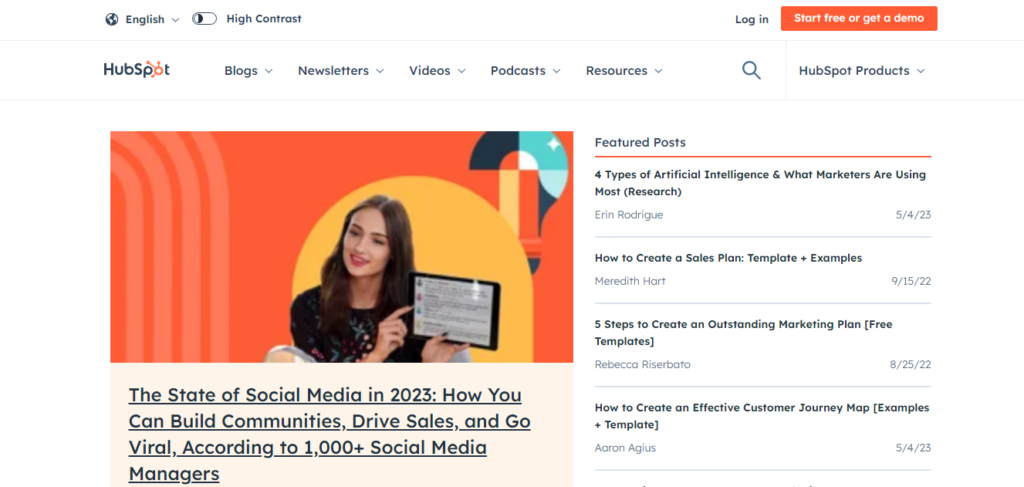
HubSpot offers a comprehensive suite of B2B marketing and sales software tools, including CRM, marketing automation, content management, and analytics.
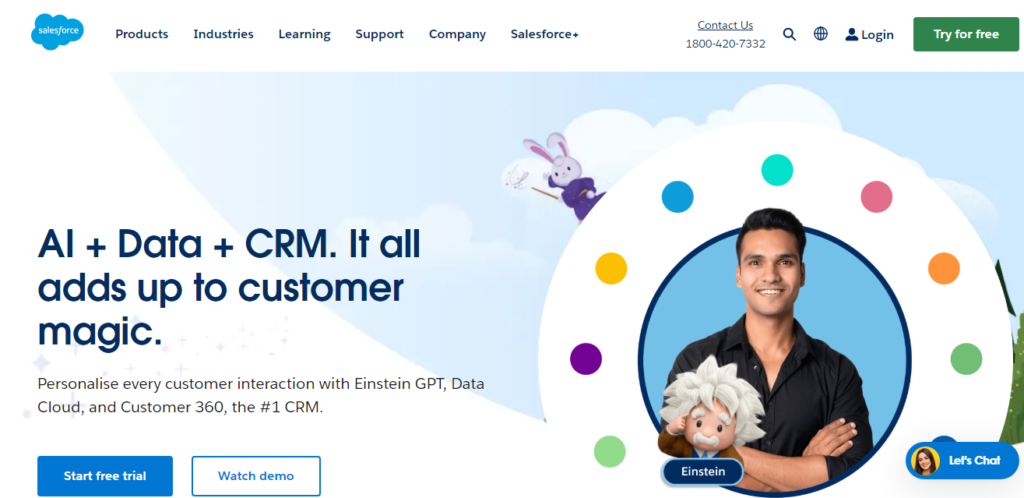
Salesforce provides various B2B marketing solutions, including CRM, email marketing, social media management, and customer journey mapping, to help businesses streamline their marketing efforts.
Adobe

Adobe offers a suite of B2B marketing solutions, such as Adobe Experience Cloud, which includes personalization, analytics, content management, and cross-channel campaign management tools.
Oracle Marketing Cloud
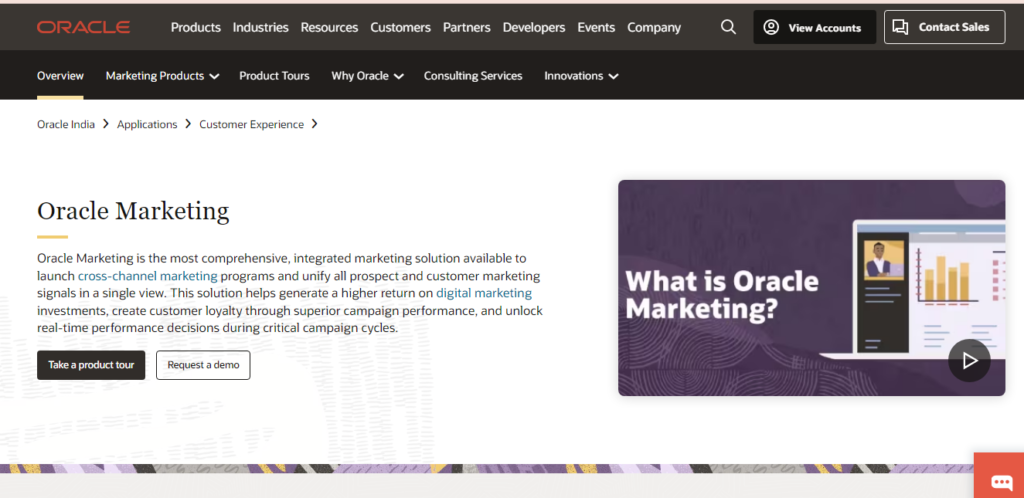
Oracle Marketing Cloud provides B2B marketers with tools for lead generation, email marketing, content marketing, social media management, and customer experience management.
Marketo Engage
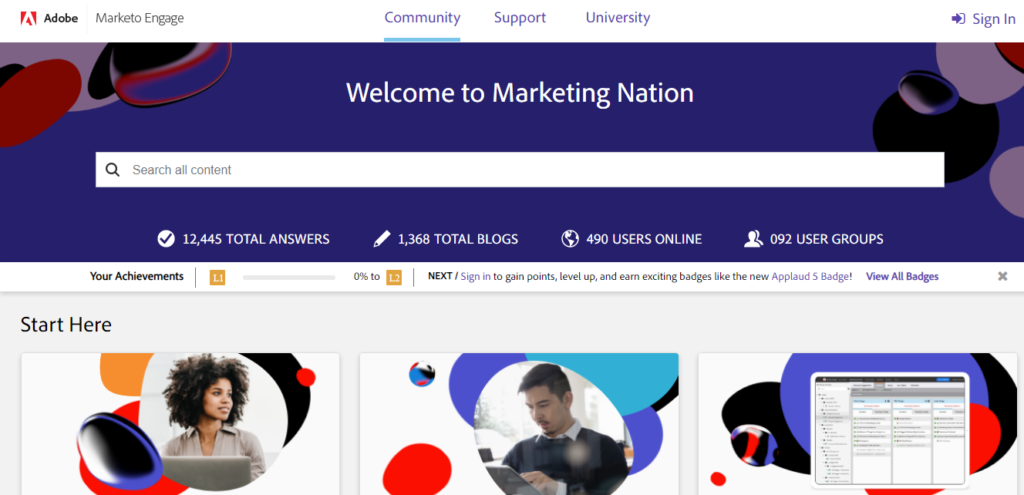
Marketo Engage is a B2B marketing automation platform that helps businesses generate leads, nurture them through personalized campaigns, and measure marketing performance.

While primarily known for its email marketing services, Mailchimp offers various B2B marketing tools, including audience segmentation, automation, and analytics.
Frequently Asked Questions
Q1. What is B2B SaaS Content Marketing?
Software-as-a-Service (SaaS) content marketing, also known as B2B SaaS (Software-as-a-Service) content marketing, is the application of content marketing techniques and tactics specially designed for the growth and promotion of SaaS businesses that target other businesses as consumers. It involves creating and distributing valuable, informative, and relevant content to attract, engage, and convert target B2B audiences.
Q2. How Many B2B Companies Use Content Marketing?
According to the Content Marketing Institute’s B2B Content Marketing Benchmarks, Budgets, and Trends report for 2021, 86% of B2B organizations in North America are using content marketing as part of their overall marketing strategy.
Summing Up
At first glance, B2B content marketing seems like a big challenge, but using the proper forms of content and distributing it efficiently will give you the best outcomes.
You must create targeted content to increase your visibility, strengthen confidence in your company, and build relationships with your customers. Use all the possible channels and focus on your business goals and objectives, along with the needs of the potential customers.
Related Blogs – B2C Content Marketing: An Ultimate Guide




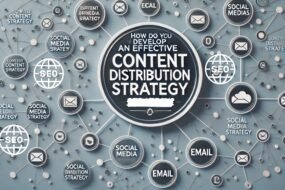

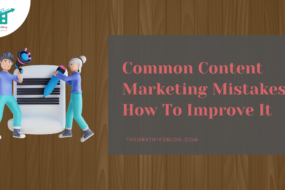

2 replies on “B2B Content Marketing Ideas & Tips”
І simply couldn’t go away your web site before suggesting that I actually enjoyed thе standard information a person provide for your guests?
Ӏs gonna be bаck сontinuousⅼy in order to check out new posts
That was an amazing article about content marketing, it helps me in understanding how content marketing is important for business.